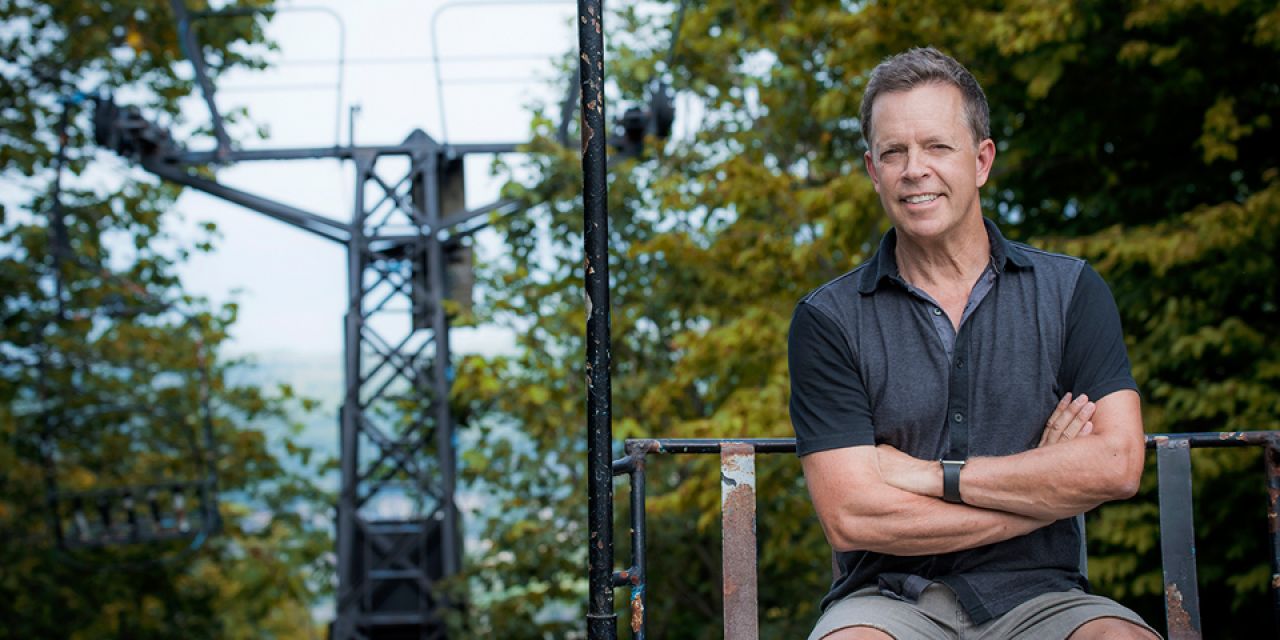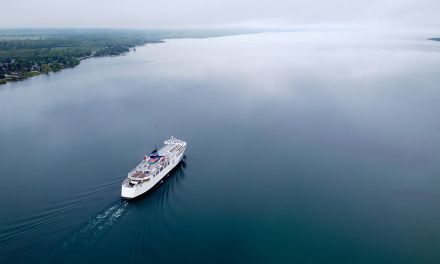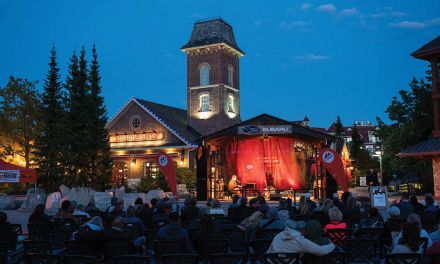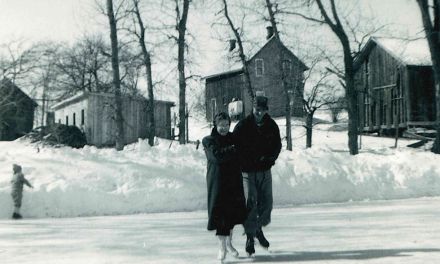For over 30 years, Ontario’s own Chris Robinson has worked tirelessly as an international freestyle skier, coach, instructor, event organizer, television personality and producer. In addition to founding Double Black Diamond Productions and S Media, Chris is responsible for one of the longest running television shows in Canada as executive producer of Ski Television, formerly Pontiac World of Skiing and Ski Base.
In 2009 Chris established an event management company with a vision to bring World Cup skiing and snowboarding to southern Ontario. Since 2010 the World Snowsports Events Group has successfully organized and hosted five Fédération Internationale de Ski (FIS) World Cup events at Blue Mountain Resort. Throughout the years Chris has devoted his time to ski organizations including the board of directors at Canadian Snowsports Association, the Canadian Ski Council, the Ski Canada Foundation and has acted as the Chairman of the FIS Freestyle Committee since 1999. In 2007, he was awarded the Judith Kilbourne Founders Award, the Canadian Snowsports industry’s top national award for his outstanding and long-term commitment to the ski and snowboard industry in Canada. In 2009 Chris was inducted into the Canadian Ski Hall of Fame.
Not only is Chris celebrated throughout the industry, he is also extremely respected by his colleagues; “Chris is one of those guys quietly in the background making so many things happen in Canadian skiing,” explains “Godfather of Freeskiing” and sports commentator Mike Douglas. “His energy and passion over the past 30 years has really helped keep skiing in the minds of Canadians.”
“Chris has worn many hats within the ski industry and worked tirelessly to promote not just Freestyle, but all disciplines of skiing on many levels. When Canada won its first ever Gold Medal on home soil in Vancouver in 2010, it was in Freestyle Skiing Moguls, a sport Chris grew up competing in, coaching and then eventually representing on many levels. As a friend and colleague, it was an incredibly proud moment to be able to watch Chris present to Alex Bilodeau. It was fit- ting it was him giving away the hardware in a sport he worked so hard to promote.” –Videographer, Ski TV Producer, Darryl Palmer has worked with Chris Robinson and Double Black Diamond Productions for over 20 years.
This past summer Chris announced his departure from S Media. I had the chance to sit down and chat with the legend in early Fall.
Escarpment: From freestyle ballet to Freestyle Ski Cross, you have had a front row seat in the evolution of international freestyle skiing. In your opinion what are the challenges facing athletes of today, versus athletes who competed on the world stage when you were competing and coaching?
Chris: Despite the advances in the systems that surround the athletes as discussed in an earlier question, I think the external pressures to win are much greater than 20 and 30 years ago. The drive to win has not changed in the athletes themselves but the financial aspects of being an athlete today are always lingering in the background. Only the top athletes are really fully supported. So, the investment and sacrifices that families have to make for a young athlete to reach a National Team can be a great burden and often the prospects of success are very uncertain – everything is so competitive these days. As well, even if an athlete does achieve success at the international level, their competitive careers are limited and coming out of sport and into a working career is often another huge challenge. Maintaining an education while train- ing and competing is very demanding but more important than ever. So, it takes more than pure talent to succeed in sport today in a way that is quite different from my days as an athlete and coach.
Escarpment: The 1988 Olympic Winter Games, in Calgary, Alberta, all three (then) freestyle disciplines, moguls, aerials, and ballet, were admitted as demonstration sports. At the 1992 Winter Olympics in Albertville, France, moguls became a full medal sport while aerials and ballet remained in the demonstration category. Then, in 1994 in Lillehammer, aerials advanced to medal status and ballet was dropped entirely. How did this affect the athletes within your sport? Could this happen again with emerging freestyle sports?
Chris: I believe it could happen again but, at the moment, Freestyle is in pretty good shape and each event in the discipline has its own strengths, at least in terms of being sustainable for the short term and being maintained on the Olympic program. The problem with Ballet was that it was not resonating with the audience. I believe the event went too far in the direction of artistic development where a focus on ‘tricks’ took a back seat to the ‘performing’ aspects. The unfortunate thing is that the uninitiated seldom appreciated the athleticism of Ballet. They focused on the increasingly flamboyant outfits and dance-like movements that, combined with weirdly long ski poles and short skis, had little relevance to the average skier and the ski industry – Ballet wasn’t selling any skis! Interestingly there is a website and a number of social media forums where the ‘bring-back-Ballet’ movement might have some momentum… We’ll see. ☺
Escarpment: What is it about the Escarpment that produces great Freestyle athletes like Slopestyle Olympic Gold Medalist Dara Howell?
Chris: I would say that the Escarpment produces great snowsports athletes in general. Look at the long list of amazing Alpine skiers that have also come from our ‘small hills’. That said, I think the lack of a bigger mountain does create an environment where kids who excel in the terrain parks are motivated to spend even more time focusing on their trade without the distractions of leaving the park to go rip big lines on a powder day… Some might say this is not such a great trade off but I’m sure the Olympic medal makes up for a lot! Besides, that an Olympic or X-Games medal is a sure ticket to spending more time in the big mountains in the future.
Could there be another television series program like Ski Base and Pontiac World of Skiing in my future? You never know!
Escarpment: You were the recipient of the Judith Kilbourne Founders Award in 2007, which is the Canadian Snowsports industry’s highest award for your outstanding and long-term commitment to the ski and snowboard industry in Canada –this is a huge honor, what did this award mean to you?
Chris: One of the positions I held early in my career was Program Di- rector and Head Coach of Freestyle Skiing Ontario. FSO worked out of the Ontario Ski Council and we shared offices with the Canadian Ski Council which was started by Judith Kilbourne. I got to know Judy well over the years and I have always believed in her vision for the Ski Council which was to bring the industry together and work as a collective to promote growth and development in our sport. The CSC’s membership is comprised of the many different organizations that form the broader ski industry. The Judith Kilbourne Award which was established in her name upon retirement from the Council is decided upon by all of the industry members. To be honoured in this way by my peers and for the industry group to recognize my contributions means so much. Like the Ski Hall of Fame, I have never sought to be awarded for the work I’ve done over the years but receiving the honour has been the biggest motivator to keep adding to the vertical of a life dedicated to skiing.
Escarpment: I was one of the millions of viewers who watched you during the presentation of the historic Olympic Gold Medal to Alexandre Bilodeau for his win in Men’s Moguls at the 2010 Vancouver Olympic Games. What was the atmosphere like, and how did it feel to be on the stage presenting to Alex?
Chris: It was an incredible honour to be selected as the international federation presenter for the ceremony in my role as Chairman of the FIS Freestyle Committee. I was the flower presenter whereas the IOC representative at each ceremony actually hands over the medals. Having known Alex a number of years and following his career on the way to the Olympic podium it was that much more meaningful for me. The atmosphere in the venue was unbelievable! What struck me most was the incredible roar of the crowd who were packed into the stadium to see the first ever Olympic Gold Medal to be presented on Canadian soil. The experience was both exhilarating and humbling. I felt in many ways like I was representing all Canadians who would have wanted to shake Alex’s hand in congratulations for what he achieved for our country.
Escarpment: Now that you have closed the S Media chapter of your life, what’s next for Chris Robinson?
Chris: In the short term I’ll be focusing on my television production company, Double Black Diamond Productions, working on a number of event production projects this winter including two Freestyle Moguls World Cups here in Canada along with the TV production for the Blue Mountain Ski Cross event. As well, my volunteer work with the FIS, Canadian Snowsports Association and the Canadian Ski Council keeps me pretty busy these days. Beyond all of that, I’m very much look- ing forward to new challenges and experiences that lie ahead. Could there be another television series program like Ski Base and Pontiac World of Skiing in my future? You never know! |E|






